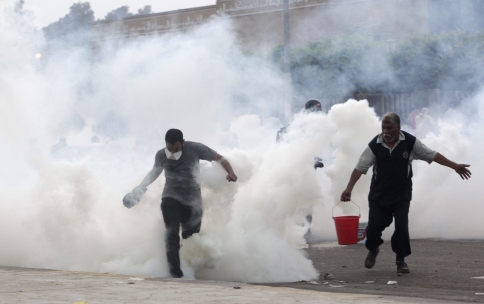 Cairo, Jul 27: At least 70 people died on Saturday after security forces attacked supporters of deposed President Mohamed Morsi in Cairo, Muslim Brotherhood spokesman Gehad El-Haddad said, adding the toll could be much higher.
Cairo, Jul 27: At least 70 people died on Saturday after security forces attacked supporters of deposed President Mohamed Morsi in Cairo, Muslim Brotherhood spokesman Gehad El-Haddad said, adding the toll could be much higher.
Al Jazeera's Egypt television station reported 120 had died and some 4,500 had been injured in the early morning violence on the fringes of a round-the-clock vigil being staged by backers of Morsi near a Cairo mosque.
Brotherhood spokesman Gehad El-Haddad said the shooting started shortly before pre-dawn morning prayers on the fringes of a round-the-clock vigil being staged by backers of Morsi, who was ousted by the army more than three weeks ago.
"They are not shooting to wound, they are shooting to kill," Haddad said. "The bullet wounds are in the head and chest."
A reporter at the scene saw 20 bodies under white sheets laid out on the blood-splattered floor of a field hospital set up at the Brotherhood sit-in at Rabaa al-Adawiya, a mosque in northeast Cairo.
Other bodies had been taken to different hospitals and as many as 1,000 people had been injured, Haddad said.
Supporters and opponents of Morsi staged mass rival rallies across the country on Friday, bringing hundreds of thousands into the streets and laying bare deep divisions within the Arab world's most populous country.
Well over 200 people have died in violence since the overthrow of Morsi, including at least nine on Friday, most of them Brotherhood supporters.
Army chief General Abdel Fattah al-Sisi, who played a central role in the overthrow of Morsi following huge demonstrations against his year-long rule, called for Egyptians to rally on Friday to give him a mandate to tackle "violence and terrorism".
Hundreds of thousands heeded his call, but Muslim Brotherhood supporters also staged mass, counter-rallies, demanding the reinstatement of Morsi, who was placed under investigation on Friday for a raft of crimes, including murder.
"Live rounds"
Haddad said police started firing repeated rounds of teargas sometime after 3:00am (0100 GMT) at protesters who had spilled out of the main area of the Rabaa sit-in and were on a main thoroughfare close to 6th October Bridge.
"Through the smog of the gas, the bullets started flying," he said. In addition to "special police forces in black uniforms" firing live rounds, he said that snipers shot from the roofs of a university, buildings in the area, and a bridge.
State news agency MENA quoted an unnamed security source as saying that only teargas was used to disperse protesters. He said no firearms were used.
Haddad said the pro-Morsi supporters had used rocks to try to defend themselves. On the podium outside the Rabaa mosque, a speaker urged people to retreat from the gunfire, but "men stayed to defend themselves because women and children are inside the sit-in", he said.
It was the second time this month there had been a mass killing near Rabaa. On July 8, 53 people died when armed men shot into a crowd after morning prayers close to a Republican Guard compound in the area.
"This is much more brutal because the Republican Guard looked like a tactical military operation. This one looks like a much more brutal aggression," Haddad said.
Egypt's army-installed interior minister, Mohamed Ibrahim, said on Friday that the month-old Cairo vigils by Morsi supporters would be "brought to an end, soon and in a legal manner", state-run al Ahram news website reported.
Sisi's rising star
There is deepening alarm in the West over the army's move against Morsi. The country of 84 million people forms a bridge between the Middle East and North Africa and receives $1.5 billion a year in mainly military aid from Washington.
Fireworks lit up the night sky over Cairo's central Tahrir Square into the early hours of Saturday, where army supporters rallied clutching posters of Sisi in full ceremonial uniform.
In a sign of the general's rising star, many of the posters depicted him alongside Gamal Abdel Nasser and Anwar Sadat, former military officers who went on to become presidents.
The investigation into Morsi centres on accusations that he conspired with the Palestinian Islamist group Hamas to escape from jail during the 2011 uprising against veteran autocrat Hosni Mubarak, killing some prisoners and officers, kidnapping soldiers and torching buildings.
Morsi has said local people helped him escape during the upheavals. Hamas challenged investigators to find "one piece of evidence" that it had meddled in Egyptian affairs.
The Brotherhood has rejected the allegations as "fantasy".
The army has appointed an interim government tasked with preparing for parliamentary elections in about six months followed by a new presidential vote. The Brotherhood says it will not join the process.






Comments
Add new comment